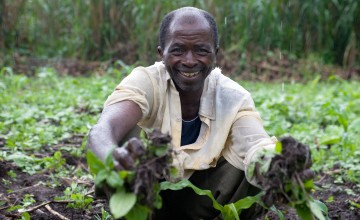
Read our 2023 annual report

Knowledge Hub
How sustainable farming is changing the world

Concern Worldwide’s work with smallholder farmers in Africa is now part of a groundbreaking African alliance that will benefit six million farmers.
Our CEO, Dominic MacSorley, examines the progress made in climate smart agriculture in the first of this two-part blog post.
Climate change
In the future we will all be eating maize in Ireland - unlikely? Think again!
Scientists estimate that even a two degree centigrade increase in the world’s temperature will fundamentally change our food production systems worldwide.
Climate change is a controversial and frequently debated topic, but two things are clear: the world’s population is growing and is expected to reach nine billion by the year 2050, and an increase in urbanisation across Africa is leading to a decline in rural farming.
Without a significant investment in new solutions, there simply won’t be enough food and the potential consequences should alarm us.
Sustainable solutions
There’s a tendency to look for solutions through new science; identifying ways to produce more food on less land and increasing production through large-scale commercial farmers. However, there are other smarter and more sustainable solutions available.
The solution lies with the current network of 500 million small farmers that produce 80% of the food consumed in Asia and sub-Saharan Africa. Now, through the work of organisations such as Concern, these half million strong food producers are driving a transformation in world agriculture.
Resilience
We work in 15 of the countries that have been listed as vulnerable to climate change by the Centre for Global Development.
As a result, we are developing new approaches to climate smart agriculture with initiatives in crop production, water, agro-forestry, livestock production and sustainability.

These are the key principles we believe are critical to achieving the goal of increased, sustainable productivity:
- Farming at any scale is a business and smallholders and producers must be treated as entrepreneurs
- Businesses need clear links along the value chain, from production to processing, marketing and, ultimately, to consumption
- To increase crop production, farmers in the most marginalised areas need to adapt to changes brought about by climate change
- Increasing crop production is not the whole story; there must be clear links to improving nutrition, especially if we are to reduce malnutrition and stunting
- Making women the focus of training delivers better results; they learn and adopt new ideas and techniques faster
Part two of this blog further examines climate smart agriculture and its benefits.
You can help to support our work by clicking the button below.


